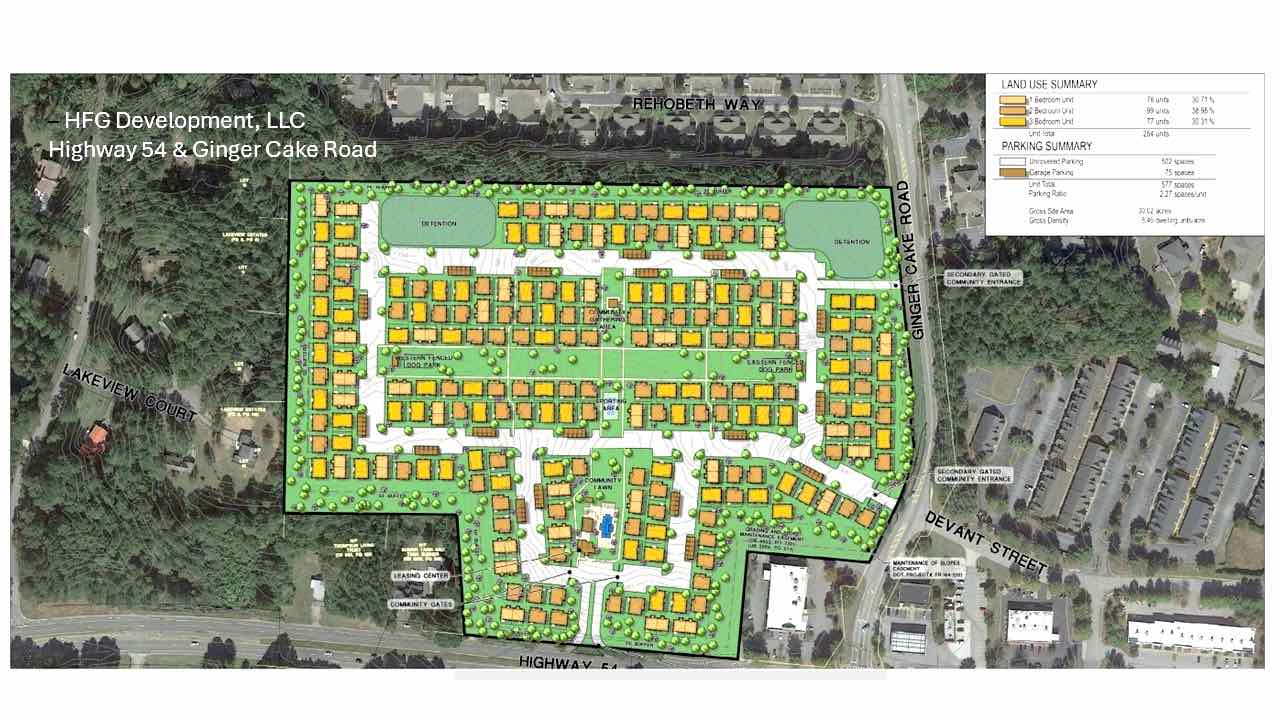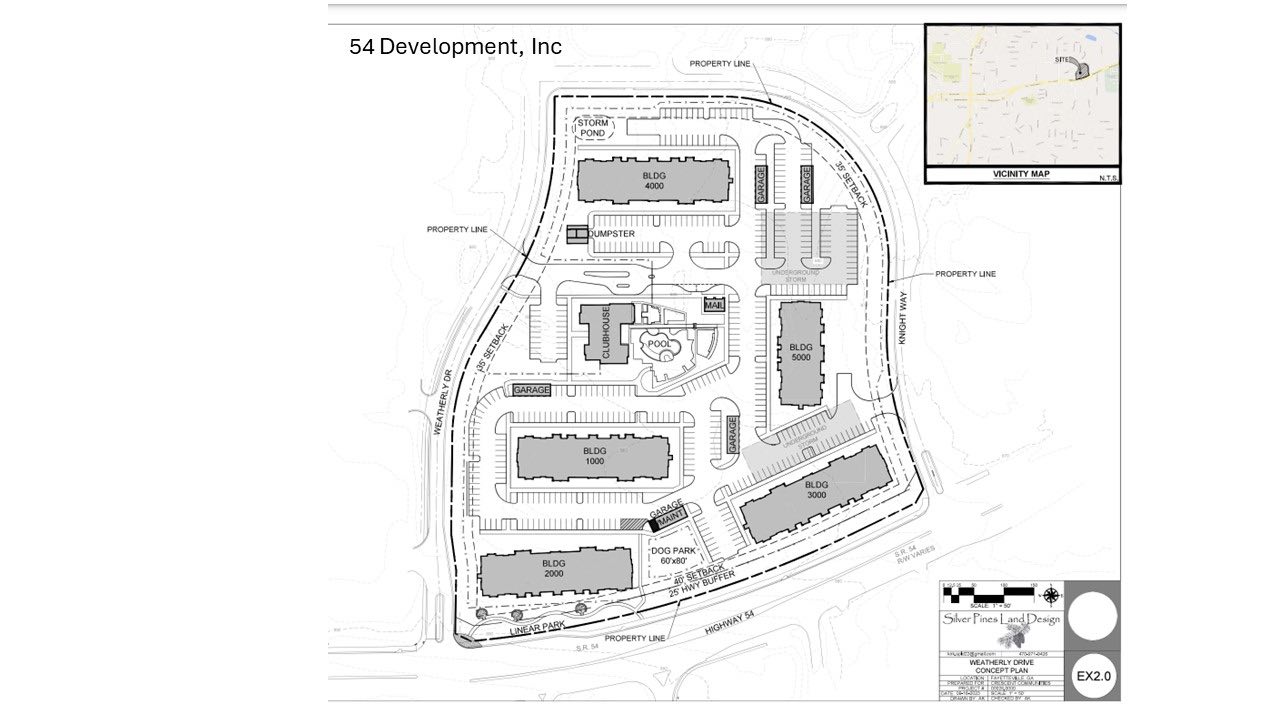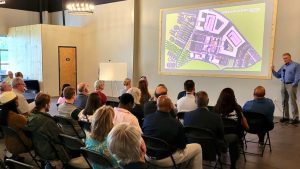We have weathered the storm, and it now appears the tide is turning. It has been a decade or more since I have seen our local citizens in Fayetteville rise to the call and say they just are not going to take it anymore.
The citizens of Fayetteville have awakened, and they are protesting loudly in opposition to the continuous approval of large, stacked multi-family developments.
Two eliminated, for now
The citizens appointed to Fayetteville’s Planning and Zoning Commission voted unanimously against two more large multi-family proposals on Tuesday evening. The members of the commission are listening, they care, and they are protecting Fayetteville’s quality of life.
For a second time, the frustrated Fayetteville taxpayers had to fight off the proposed 22-acre rezoning proposal at Highway 54 and Ginger Cake Road that would have allowed an unbelievable number of condominium buildings to pack the entire site (see site photo).

The proposal from large warehouse builder HFG Development, LLC is about as bad of a development plan as we have seen in quite a while. The two large detention stormwater drainage areas were probably the best features of the development plan, it was that bad.
It is more of the urban jumbled style of land planning that Mayor Ed Johnson’s administration has been forcing on the community without regard to how building thousands of new multi-family units, overcrowding our schools, congesting all our streets, and pandering to the real estate developers affects the taxpayers.
The excuse of “there aren’t trailers behind the schools yet” is a poor excuse, indeed.
The Planning and Zoning Commission also denied 54 Development, Inc.’s bulky and ungainly complex proposal off Weatherly Drive (see site photo).

Once again, the developer packed the site, border-to-border, with asphalt and concrete, 273 townhouse condominiums. The only original project highlights were a pocket-size dog area and the dumpster locations.
Blinders on the city council
Keep in mind that these developers spend a significant sum on surveys, engineering, architects, landscape designers (not as much), and staff time to make such rezoning and construction appeals to the city. They are not going to make that kind of investment unless they believe a majority of the city council members are supporting the development proposals.
Rolling out the welcome mat, Fayetteville’s City Council seems to be oblivious to over-supply risks in our market (Fayette, Coweta, Henry, Clayton, and South Fulton). Additionally, multi-family developers are facing challenges in financing, as well as rising construction costs that have placed pressure on development proformas.
Economic pressures lead to reduced construction quality, reduced maintenance, and low standards for renter approval to be profitable. Remember, the developers and owners can file bankruptcy and walk away.
The bite of the condominium and townhouse sector is the younger and the older owners cannot afford significant increases in monthly maintenance fees or special assessments to keep up with sharply rising labor and material costs over time.
The condominium and townhouse sector deteriorates faster than other forms of residential dwellings. High rates of foreclosure are common.
Fayetteville taxpayers poured onto local Facebook pages to express their displeasure with the direction the city council is going with the urbanization efforts and the departure from a charming, safe, family-oriented community with an inviting small-town feel.
You’re not important enough
Local resident Janice Gill voiced her concerns in an email to Mayor Ed Johnson. Gill received a disappointing response from the government she funds and decided to publish the email on Facebook.
The terse email response reads:
“Sorry that you do not like the managed growth that is occurring in Fayetteville. The City Council and staff have a shared vision to ensure we provide the proper housing mix to accommodate the growing population. Best wishes to you.”
The condescending response with the “if you don’t like it, too bad” tone says a lot about what is wrong with the current administration, so much for citizen engagement.
First, what is “managed” about Fayetteville’s growth? Adding thousands of multi-family units with many thousands of occupants and their cars without regard to overwhelming the road infrastructure, especially at the intersection of the two main highways, is not managing anything (just ask Peachtree City).
Shocking that it’s “the city council and staff” having a shared vision. What about the taxpaying citizens? Apparently, the domineering government’s vision has not been shared much because a multitude of the citizens are furious, and their fellow citizens on the Planning and Zoning Commission rightly denied the repugnant proposals.
Can the city council please tell us what “the proper housing mix” is in their minds so that the voters will know how to respond at the next municipal election in 2025?
The city is creating a podcast series on its “progressive development” as Johnson labels it that citizens need to follow intently (see: https://www.fayetteville-ga.gov/650/CityVision-Podcast). The first episode offered no clues.
Fayetteville Councilman Rich Hoffman calls it “changing with the times.” Is replicating Gwinnett County with large multi-family complexes going up all over what changing with the times looks like?
It would be beneficial if Hoffman and his colleagues clearly defined what type of development is acceptable and what is unacceptable. “When we look at projects, we not only look at land use, we also look at how many cars it’s going to generate,” Hoffman says. Oh, really?
Hoffman says the large apartment complexes do not generate a lot of traffic. Does he honestly believe the thousands of residents in multi-family units do not drive? He admits there are a lot of approved developments that have yet to come out of the ground. How many and what kind of developments?
Fayetteville City Councilman Joe Clark entered the fray on Facebook regarding the two dismal proposals. Clark likes to play a little game where tries to segregate apartments from condominiums. Packed lots full of condominium buildings are stacked with multi-family housing, causing the same if not more problems than the apartments, but Clark yearns for them.
Clark is not worried about the impact on our local schools that adding thousands of multi-family units would create. Likewise, he noted, “Fayetteville continues to win State and Regional Awards for Planning and being a Visionary City.”
Receiving awards from urban planners from parts of metropolitan Atlanta where we would never choose to reside, and have fled, is not encouraging to many. You must build a lot of stacked multi-family complexes to qualify as a progressive “visionary city” in Atlanta.
Moving forward, hopefully
The citizens in Fayetteville are finding their common voice and organizing on social media. They moved to Fayetteville for a reason before the multi-family complex stampede. They do not want to move.
Like most residents in Fayette County, they want a safe community to raise a family with low crime, nice parks, friendly neighbors, convenient travel times, and good schools without trailers parked behind them. That is a real vision worth fighting for and most will agree.
The urbanization nonsense and attracting tens of thousands of more residents to live in stacked multi-family complexes is a path to disaster. The cyclical nature of the residential rental market eventually brings communities crashing during the low points.
There are quite a few of us in Fayette County who grew up in DeKalb County. DeKalb used to be the top-ranked county in the entire state with the best school system and amenities.
When I lived in DeKalb, it was one of the fastest-growing and most sought-after counties in the nation. Unfortunately, the leadership began making a lot of bad decisions. They overbuilt multi-family housing, and the market cycles created some desperate times with many of the complexes becoming derelict areas. The quality of life changed dramatically, and the prestigious school system rapidly declined while crime increased.
We have people who fled Gwinnett and Cobb Counties living among us with very similar experiences.
Elected officials get all excited when they get to approve big development deals. Many of them rarely consider the long-term consequences.
Do not forget, that the people managing the real estate investment trusts (REITs) in other parts of the country who own the apartment complexes do not care about your community and they do not care about the residents. Soon or later, they will sell it to the next REIT who also will not care.
For the sake of all the wonderful families in Fayette County, I am hoping we will continue to fight for our quality of life and that our elected officials will learn from the mistakes of other counties.
Never stop raising your concerns. Use the power of your vote in the 2025 municipal elections.
[Brown is a former mayor of Peachtree City and served two terms on the Fayette County Board of Commissioners. You can read all his columns by clicking on his photo below.]











Leave a Comment
You must be logged in to post a comment.